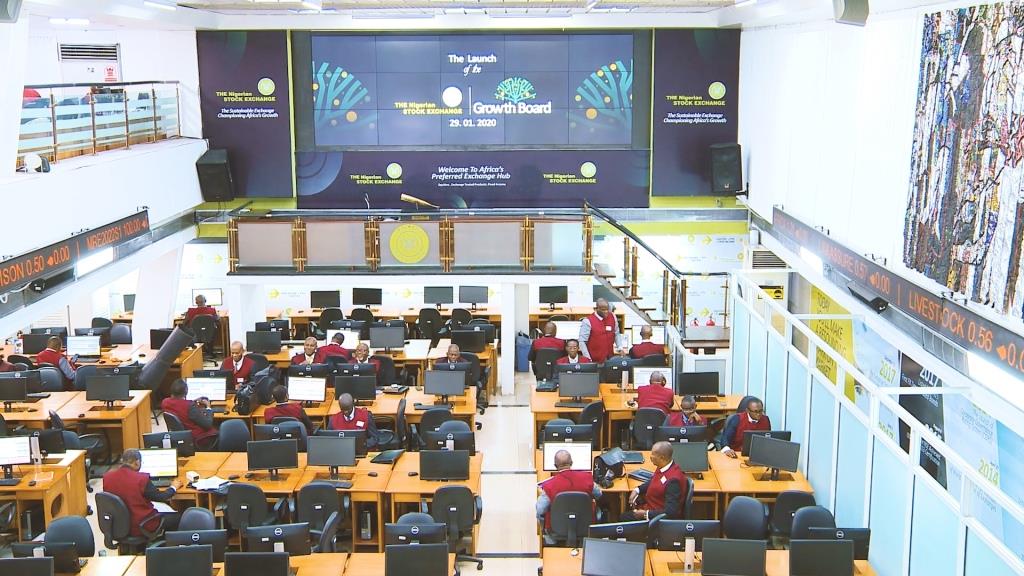Economy
NSE Helps Investors Recover N305m Shares, Get N17m Compensation

By Dipo Olowookere
In 2020, the Nigerian Stock Exchange (NSE) facilitated the restitution and recoveries of shares worth N305.11 million for investors.
Also, the exchange assisted not less than 49 investors/claimants who suffered pecuniary losses to get compensation worth N17.02 million in the year.
The Chief Executive Officer of the NSE, Mr Oscar Onyema, while speaking Tuesday during the review of the bourse’s performance last year and what to expect in 2021, assured that the exchange will continue to protect investors to deepen the market.
He also said reiterated the intention of the exchange to aggressively pursue cutting-edge products and services, access new markets and deliver better value to its stakeholders.
Mr Onyema described “the year 2020 [as] a historic one for global capital markets,” especially the Nigerian market, which recorded a growth of over 50 per cent despite the “buffeting headwinds.”
He attributed this to the “renewed investor optimism coupled with improved economic conditions and low fixed income yields.”
“Of 93 global equity indices tracked by Bloomberg, the NSE All-Share Index (ASI) emerged the best-performing index in the world, surpassing the S&P 500 (+16.26 per cent), Dow Jones Industrial Index (+7.25 per cent) and other global and African market indexes, to post a one-year return of +50.03 per cent,” he said.
He noted that this year, the bourse has started “on a positive note as the ASI has already returned 2.0 per cent after 11 trading sessions.”
“We expect the marginal reopening of businesses, normalisation of the economy and revenue-diversification drive of the Nigerian government to elicit positive sentiments throughout the year,” he added, warning that, “Our growth expectations should be noted with caution, as the recent second wave of COVID-19 in Nigeria and globally, may slow down renewed social and economic activities.”
Mr Onyema expressed optimism that the exchange’s vision to be Africa’s preferred Exchange Hub would be achieved with the transitioning of the NSE to a demutualised exchange group and the appointments of Mr Temi Popoola as the CEO of NGX and Ms Tinuade Awe as CEO of NGX REGCO.
Last year, the Nigerian equities market got off to a strong start, returning 10.4 per cent by the eighth trading session and by October, it entered a much-awaited bull run.
Buoyed by the formal declaration of the U.S president-elect, unattractive fixed-income yields and better-than-expected corporate earnings, the NSE ASI recovered from Q1’20, to close the year at 40,270.72 (+50.03 per cent) and erase losses of 14.90 per cent recorded in 2019.
During its remarkable year-end run, the ASI gained 6.23 per cent in a single trading session which triggered a 30-minute halt of trading on all stocks for the first time since the NSE Circuit Breaker was introduced in 2016 to safeguard market integrity in periods of extraordinary volatility.
At the close of the year, the NSE’s equity market capitalization was up by 62.42 per cent, from N12.97 trillion in 2019 to N21.06 trillion in 2020 while market turnover saw an uptick of 7.25 per cent, from N0.96 trillion in 2019 to N1.03 trillion in 2020.
Although Initial Public Offering activity was mute, the value of supplementary issues increased dramatically from 2019, rising by 851.37 per cent to N1.42 trillion, from N148.77 billion.
Also noteworthy is that for the second consecutive year, equity market transactions were dominated by domestic investors who accounted for 65.28 per cent of market turnover by value (retail: 44.98 per cent; institutional: 55.02 per cent) while foreign portfolio investors accounted for 34.72 per cent.
Capital-raising activities in the fixed income market increased significantly in 2020 as the NSE’s bond market capitalisation rose by 35.52 per cent from N12.92 trillion in 2019 to N17.50 trillion.
Continuing the trend in recent years, the Federal Government of Nigeria dominated issuances, raising over N2.36 trillion which comprised nearly 92 per cent of total bond issuances. Corporates also leveraged the low yield environment to fund expansion objectives and pursue debt refinancing, raising a total of N192 billion.
Business Post reports that apart from Mr Onyema, a presentation was made by the Managing Director/Chief Economist, Africa and the Middle East, Global Research at Standard Chartered Bank, Ms Razia Khan, who provided insights into the global macroeconomic environment and the outlook and opportunities in the Nigerian capital market.
Economy
Dangote Refinery Shares to be Available to Public in Five Months

By Adedapo Adesanya
The chairman of Dangote Group, Mr Aliko Dangote, has said that within the next five months, Nigerians should be able to purchase shares of Dangote Petroleum and Refinery.
Mr Dangote made this revelation on Sunday during a tour of the facility by the chief executive of the Nigerian National Petroleum Company (NNPC) Limited, Mr Bayo Ojulari, alongside members of the company’s executive management.
The $20 billion refinery is the largest single-train refinery in the world with 650,000 barrels per day refining capacity. There are efforts to boost the capacity to 1.4 million barrels per day soon.
Speaking with journalists, Mr Dangote said, “And the other issue is that they (NNPC) are holding 7.25 per cent of the shares that we have here, which is more than the shares Elon Musk has in Tesla. And they are holding that on behalf of Nigerians,” he said.
“So individually, Nigerians too will have an opportunity in the next, maybe a maximum of four to five months. There will actually be an opportunity to buy the shares.”
He added that shareholders will have the option to receive their dividends in either naira or dollars, as the refinery also earns in dollars.
Commenting on Mr Ojulari’s visit, the billionaire businessman said the NNPC, represented by Mr Ojulari and its management team, was not just a guest but a shareholder.
“Today is really our best day ever” at the facility. I know NNPC invested in us when we were not really sure whether the refinery would be successful.
“So that’s the kind of level of confidence. But right now, the relationship with the new set of people that we have at NNPC, I think the sky is the limit, and we will cooperate and also make sure that we work together to make sure that we make Nigerians proud.”
Speaking on prospects of partnership with NNPC in the upstream sector, he said, “We have block 71, 72, but we’re going to look much deeper”.
“Most likely, depending on our own discussions with them, we will partner with them, maybe in some of the upstream. They, too, will partner with us here because here is not just a refinery, it’s an industrial hub.
“And that’s why we’re doing linear alkaline benzene, which is a raw material for detergents, ” he added.
Economy
NGX Investigates Zichis Stocks After 859% Rise in One Month

By Aduragbemi Omiyale
The Nigerian Exchange (NGX) Limited has launched an investigation into trading activities on the shares of Zichis Agro-Allied Industries Plc.
A notice from Customs Street on Monday disclosed that this has led to the suspension of the company for now.
This development comes about a month after Zichis was listed on the domestic bourse and placed in the growth board of the NGX.
In the circular, it was disclosed that the suspension may be lifted after the conclusion of the findings, but for now, investors will not be able to trade the organisation’s securities on the NGX platform.
“The suspension of trading in Zichis shares shall be lifted upon the conclusion of an investigation into the trading activities on the company’s shares,” a part of the disclosure stated.
The bourse explained that it wielded the big stick on Zichis in compliance with Rule 7.0, Rules on Suspension of Trading in Listed Securities, Rulebook of The Exchange (Issuers’ Rules).
This part of the law states that, “Notwithstanding any of the foregoing provisions, the exchange may, in accordance with any of its rules, place the trading of any security on suspension.
“It may also do so if it is of the view that such suspension will be in the interest of the investing public and in accordance with the SEC Rules.”
In announcing the action on the firm, the NGX declared that, “The shares of Zichis Agro-Allied Industries Plc have been suspended from trading on the facilities of Nigerian Exchange Limited (NGX), effective today, Monday, February 23, 2026.”
Business Post reports that last week, shares of Zichis appreciated by 60.74 per cent to N17.36. It joined the stock exchange at N1.81, indicating it has gained N15.55 or 859.12 per cent in one month.
Economy
Nigeria Investment Fund, Japan Unveil $50m Innovation Fund for Startups

By Adedapo Adesanya
The Nigeria Investment Authority (NSIA) and Japan International Cooperation Agency (JICA) have finalised agreements to launch a $50 Sovereignmillion impact innovation fund aimed at strengthening the Nigerian start-up ecosystem.
The fund is expected to provide patient capital to pre-seed, seed, and early-stage startups addressing critical social challenges in sectors such as agriculture, healthcare, education, energy, waste and water management.
JICA will provide $14 million in grant support, while NSIA contributes up to $20 million to match the grant.
Structured as an onshore public fund, the initiative combines financial support with technical assistance to help startups refine products, scale operations, and expand into new markets.
The fund is expected to create jobs, improve livelihoods, and contribute to sustainable economic development across Nigeria.
Speaking at the agreement signing ceremony between NSIA and JICA at the Ministry of Budget and Economic Planning, Mr Aminu Umar-Sadiq, the chief executive of NSIA, said: “The Fund represents a transformative step for Nigeria’s startup ecosystem. By providing early-stage ventures in high-impact sectors with the capital and support they need to grow, we are enabling innovators to tackle some of Nigeria’s most pressing challenges. Our collaboration with JICA underscores our commitment to entrepreneurship, inclusive growth, and sustainable development.”
Preparations are underway to operationalise the Fund and develop a pipeline of high-impact startups ready for investment. NSIA remains committed to advancing socio-economic development through strategic partnerships that scale impact, expand innovative solutions, and unlock access to capital.
On his part, the Japanese Ambassador to Nigeria, Mr Suzuki Hideo, said, “The Government of Japan hopes this new project will take root in Nigeria and bear fruit swiftly.”
-

 Feature/OPED6 years ago
Feature/OPED6 years agoDavos was Different this year
-
Travel/Tourism10 years ago
Lagos Seals Western Lodge Hotel In Ikorodu
-

 Showbiz3 years ago
Showbiz3 years agoEstranged Lover Releases Videos of Empress Njamah Bathing
-

 Banking8 years ago
Banking8 years agoSort Codes of GTBank Branches in Nigeria
-

 Economy3 years ago
Economy3 years agoSubsidy Removal: CNG at N130 Per Litre Cheaper Than Petrol—IPMAN
-

 Banking3 years ago
Banking3 years agoSort Codes of UBA Branches in Nigeria
-

 Banking3 years ago
Banking3 years agoFirst Bank Announces Planned Downtime
-

 Sports3 years ago
Sports3 years agoHighest Paid Nigerian Footballer – How Much Do Nigerian Footballers Earn











